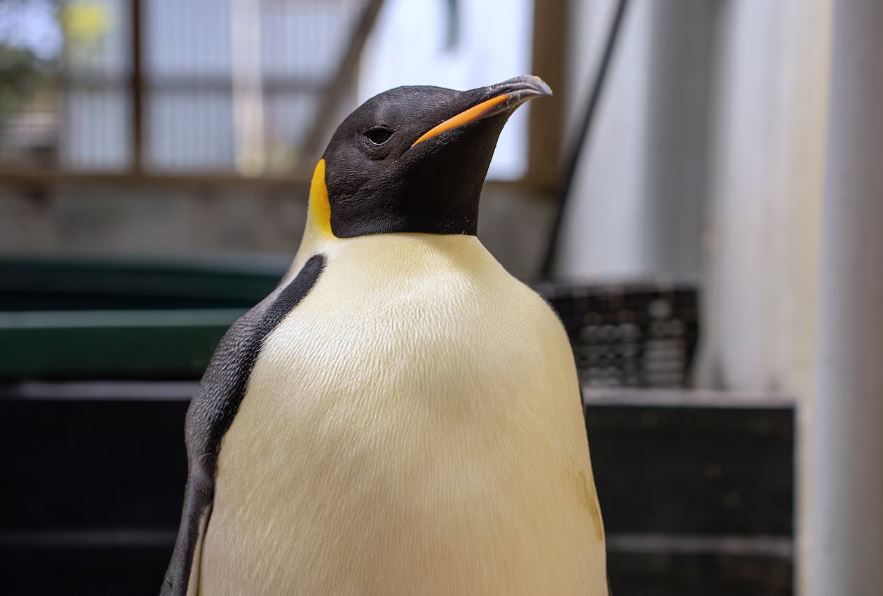


 6:42:36
6:42:36  2024-11-17
2024-11-17  1152
1152

As keen navigators of the wild, penguins often wander the far limits of their territories.
Normally, these ice-cold explorations are pretty short-lived. But in an astonishing feat, one emperor penguin, alone and malnourished, recently made landfall on a beach in Australia, more than 2,000 miles away from its native Antarctica.
For a human, that distance is equivalent to doing more than 44,000 laps in a 50-meter Olympic-sized pool.
On Nov. 1, the adult male was spotted waddling up Ocean Beach in Denmark, a town in Western Australia, where he was later brought to safety by local wildlife experts. The arrival of the emperor penguin, now nicknamed Gus, marks the first time the species has ever reached the continent.
In the bird world, rare displacements such as these are referred to as vagrancies, says Casey Youngflesh, an associate professor at Clemson University who utilizes data science to study ecology and understand drivers of biodiversity.
“If a species showed up all the time, we’d just consider that to be part of their range,” he says. “Truthfully, we still don’t understand a lot about the marine environment and don’t have a good idea where many animals spend their time.”
Adrift in the coldest place on Earth, emperor penguins, which can grow up to 45 inches tall and live between 15 and 20 years, typically reside in colonies with populations that can range from a few hundred to thousands of members. But even huddling up isn’t a guarantee against surviving the elements, and penguins owe their every advantage to several unique adaptations.
Incredibly dense feathers protect penguins from Antarctica's freezing temperatures and biting winds, and substantial fat stores allow them to fast for long periods. These animals are also phenomenal swimmers, capable of diving to depths of over 450 meters.
Though these abilities may not serve them as well in much warmer climates, these characteristics could certainly have helped this male penguin make the arduous journey to Australia, says Youngflesh.
Gus was found alive and moving but severely underweight, enough so that its backbone was visible at an angle, according to a wildlife rehabilitator with the country’s Department of Biodiversity, Conservation and Attractions. Gus will likely need weeks of rehab before he’s completely healthy again and can be potentially released back into familiar waters.
Determining what exactly caused the penguin to end up where he did is another matter, as some experts suggest that he could have been blown off course by a storm and gotten disoriented or had some of its other navigational senses disrupted in some way.
This latest occurrence isn’t even the first time a member of the species has been sighted far from their place of origin. In 2011, one resident reported seeing an emperor penguin in similar circumstances, stranded on a beach in New Zealand. In 2002, a Humboldt penguin native to South America was found in Alaska after it reportedly stowed away on a fishing ship.
In both cases, further human interference was unnecessary, and the roaming animals likely journeyed home.
Despite how infrequently marine birds debark on distant lands, Gus’s case may be indicative of how quickly the Antarctic environment is changing and how local species are affected. Emperor penguins, for example, depend on stable sea ice to reproduce, but as climate change increasingly causes ice shelves to melt, the species is expected to undergo rapid population decline in the next few decades.
These vast environmental changes, coupled with diminishing food sources mean that some animals must search farther for food and shelter than they otherwise would. To that end, while this unusual event isn’t currently indicative of a larger pattern, experts should take note as animal vagrancy can sometimes be a predictor of future range expansions, says Youngflesh.
Reality Of Islam |
|

Researchers

A well-know

Scientists

As AI-power
 9:3:43
9:3:43
 2018-11-05
2018-11-05
10 benefits of Marriage in Islam
 7:5:22
7:5:22
 2019-04-08
2019-04-08
benefits of reciting surat yunus, hud &
 9:45:7
9:45:7
 2018-12-24
2018-12-24
advantages & disadvantages of divorce
 11:35:12
11:35:12
 2018-06-10
2018-06-10
 6:0:51
6:0:51
 2018-10-16
2018-10-16
al-hussain (peace be upon him)
 10:18:1
10:18:1
 2022-09-21
2022-09-21
 8:19:41
8:19:41
 2018-06-21
2018-06-21
allah will not answer all your prayers
 6:56:28
6:56:28
 2022-01-01
2022-01-01
 4:2:19
4:2:19
 2022-10-10
2022-10-10
 1:38:41
1:38:41
 2021-12-08
2021-12-08
 2:42:26
2:42:26
 2023-02-02
2023-02-02
 8:3:0
8:3:0
 2018-06-21
2018-06-21
 5:41:46
5:41:46
 2023-03-18
2023-03-18
| LATEST |